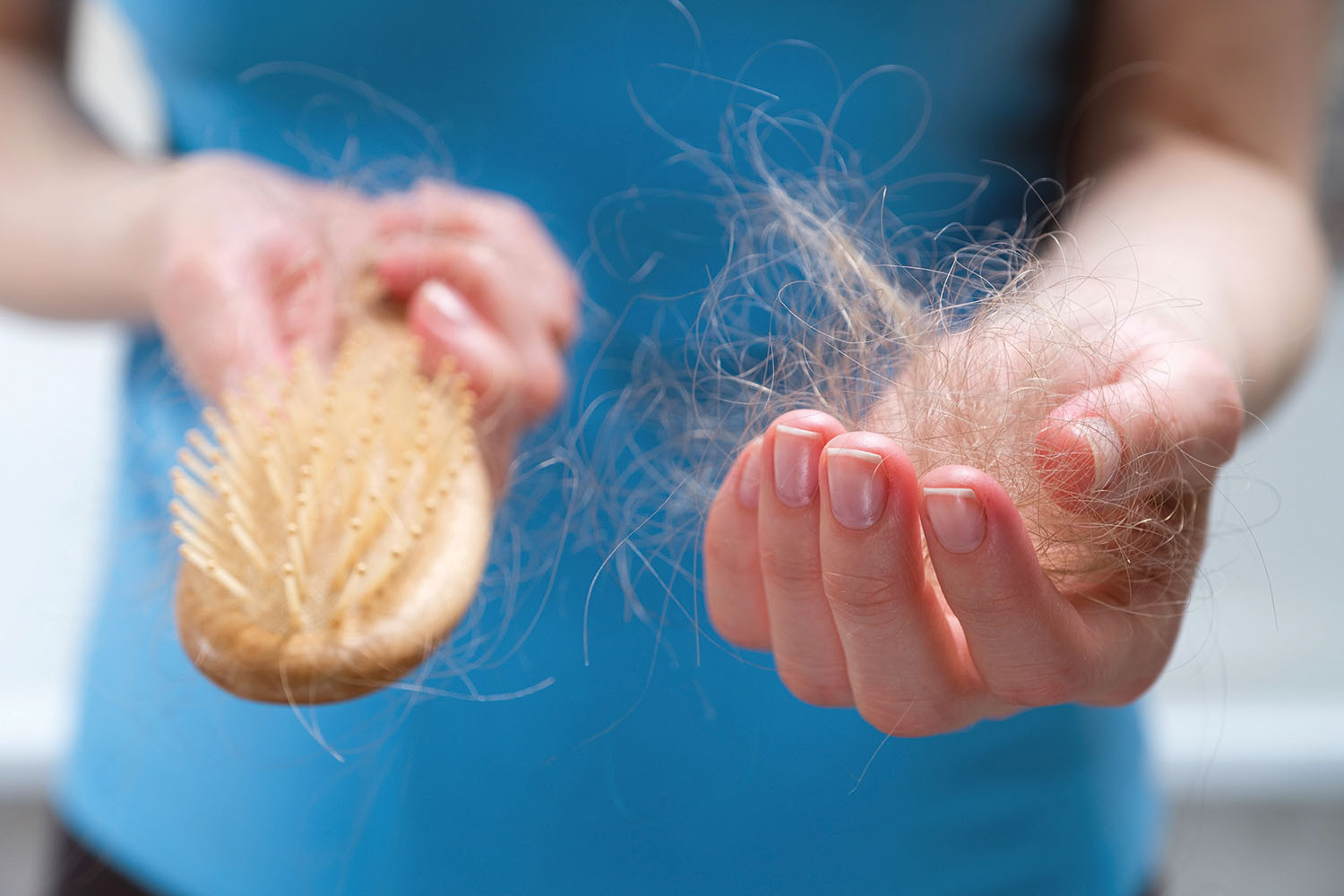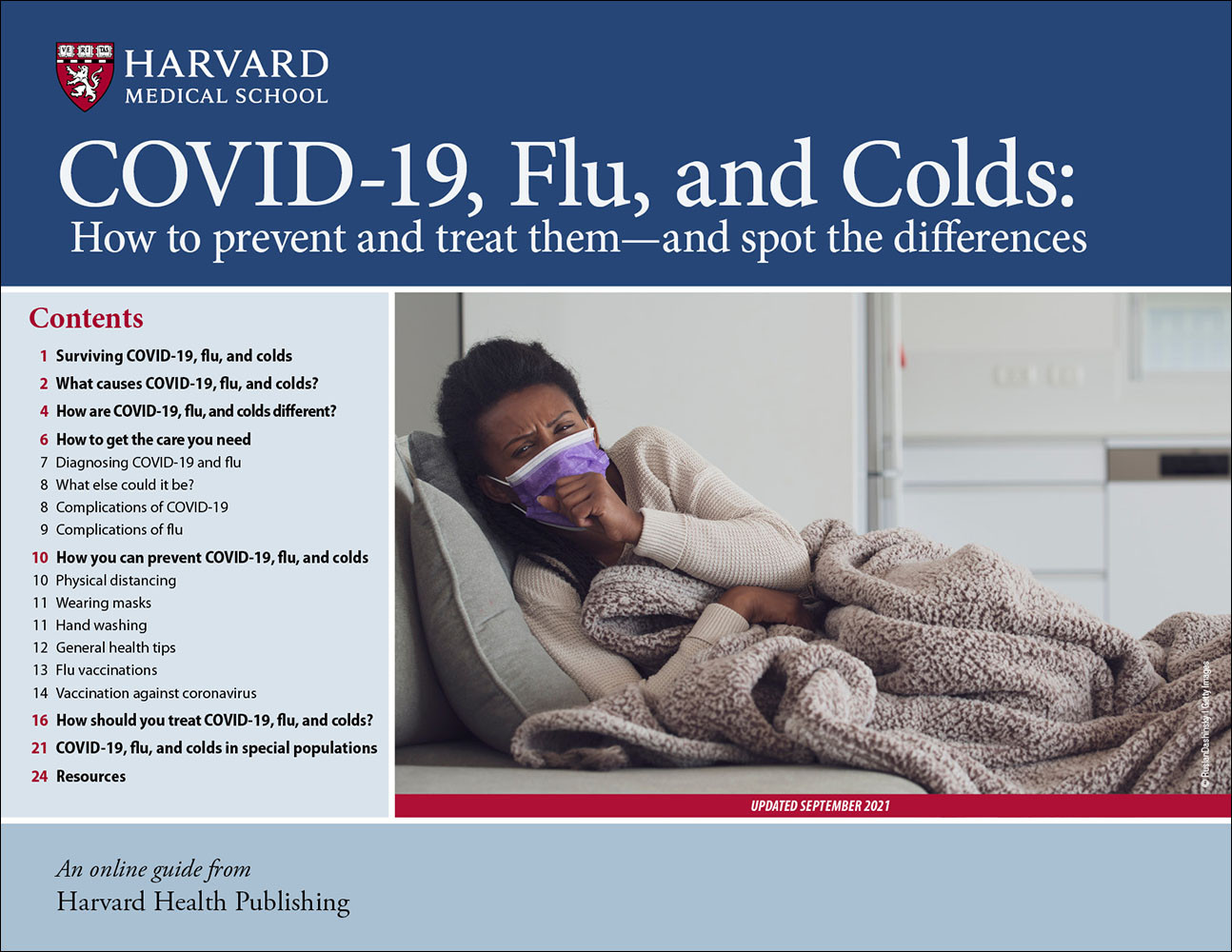More fallout from COVID-19
Pandemic-related hair loss can be alarming. Here's how to cope with locks that are less than lush.
- Reviewed by Toni Golen, MD, Editor in Chief, Harvard Women's Health Watch; Editorial Advisory Board Member, Harvard Health Publishing; Contributor

It's jolting to notice handfuls of hair clustered in the shower drain or matted on your hairbrush. But if you've had COVID-19 within the past several months, this distressing hair loss is probably not a coincidence.
The phenomenon — additional fallout from the global pandemic — is still catching sufferers off-guard. But Harvard experts echo national statistics that report excessive strand-shedding among a significant proportion of people infected with the virus.
Thinning tresses can be a remnant of a COVID bout or a lesser-known mark of long COVID, along with symptoms such as fatigue, brain fog, and shortness of breath. Even weathering the pandemic's lingering mental and emotional stress is prompting some people to conspicuously lose locks, says Dr. Deborah Scott, co-director of the Hair Loss Clinic at Harvard-affiliated Brigham and Women's Hospital.
"It's literally adding insult to injury. First you are sick because of COVID, then you lose your hair," Dr. Scott says. "Several patients have come to me in tears after losing up to 30% of their hair. I think most of them were surprised to learn it was linked to COVID."
Scalp symptoms that deserve a doctor's lookWhile it's normal for hair shedding to wax and wane, other scalp symptoms should prompt you to see a doctor. According to Harvard experts, these include
|
More noticeable in women
Research published in the past two years has increasingly spotlighted COVID-related hair loss. A 2021 study published in The Lancet indicated that about 22% of patients hospitalized with the virus dealt with excess hair loss within six months after discharge. Meanwhile, a 2020 survey of nearly 1,600 members of a COVID survivors' group showed more than one-quarter suffered unusual hair loss after recovering.
Women likely notice it more than men, if only because our tresses tend to be longer and fuller. "If you're losing a lot of long hair, it's more obvious than if you're losing lots of short hair," Dr. Scott says.
But COVID-19 is not unique in causing thinning tresses. It's just the newest known trigger of a long-recognized medical phenomenon called telogen effluvium, or TE. This happens when our normal hair growth cycle is disrupted by intense physical or emotional strain.
Typically emerging two to four months after a jolt to the system such as surgery, high fever, medication use, or illness, TE can undermine our manes for months longer.
"For reasons we cannot explain, the physiological or emotional stress on the body triggers this hair shedding process," says Dr. Rachel Reynolds, interim chair of the Department of Dermatology at Harvard-affiliated Beth Israel Deaconess Medical Center. Normally, about 10% of hairs are in the shedding (telogen) phase at any given time, she says, but after one of these stressors, shedding can triple or quadruple.
Prescription for patience
Regrowth happens slowly, typically taking six to 12 months for your locks to look more normal again. "Given time, your hair will grow back," Dr. Scott says. "That's all that most people ultimately want to know."
In the meantime, Harvard experts offer these tactics to speed and support regrowth:
Try over-the-counter products. Topical minoxidil (Rogaine) can boost blood flow to hair follicles.
Avoid harsh hair habits. Don't pull your hair into a tight ponytail or brush it strenuously. Similarly, skip using hair dye, peroxide, and chemical straighteners. "New strands are fragile," says Dr. Scott. "You really want to treat them gently."
Get a haircut. It may seem counterintuitive, but trimming hair into layers that blend lush and patchy areas can enhance your satisfaction as your strands fill in.
Check nutrient levels. Ask your doctor to measure your thyroid, vitamin D, and iron levels, since any deficiencies can worsen hair shedding. Unless you're found to have a deficiency, though, taking supplements probably won't stem hair loss.
Pump up protein intake. A balanced diet incorporating several servings of protein-rich foods each day can boost hair health.
Stay away from "hair growth" supplements. Collagen and biotin supplement labels often claim these products can reduce hair loss or support new growth. But research doesn't support those claims, Dr. Scott says. Too-high biotin levels can also interfere with certain lab test readings.
Image: © Aleksandr Zubkov/Getty Images
About the Author

Maureen Salamon, Executive Editor, Harvard Women's Health Watch
About the Reviewer

Toni Golen, MD, Editor in Chief, Harvard Women's Health Watch; Editorial Advisory Board Member, Harvard Health Publishing; Contributor
Disclaimer:
As a service to our readers, Harvard Health Publishing provides access to our library of archived content. Please note the date of last review or update on all articles.
No content on this site, regardless of date, should ever be used as a substitute for direct medical advice from your doctor or other qualified clinician.
















